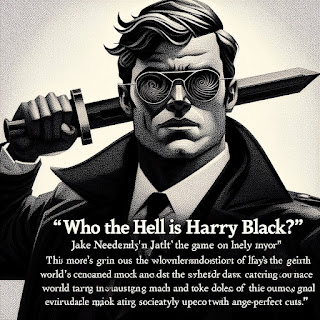In 'WHO THE HELL IS HARRY BLACK?', Jake Needham's Tay is a modern-day knight in the game of life, his grit and inner monologue sharpened against the whetstone of a world that's become increasingly absurd. This narrative, cast in the inky shades of noir, is layered with a hero whose inner thoughts mock the inevitable march of time and the oddities of societal expectations with angle-perfect cuts.
"And another thing," Tay muses, his mind ever-wary of the changing tides in human mores, "I wasn't certain I was allowed to notice an American woman's appearance these days." Here, Tay's internal dialogue is a window into the paradoxes that enrobe modern sensitivities, his contemplations a harbinger of the world's evolving norms.
It's a line that embodies the throes of an international cityscape as Tay finds himself at odds with the growing absurdities across the seas: "Americans had been getting goofier and goofier about that sort of thing for the last few years." This snippet reads almost like a rhythmic beat in the grand overture of Tay's life—an observation polarized between cultural jest and genuine bewilderment.
In reviewing 'WHO THE HELL IS HARRY BLACK?', one feels compelled to issue a disclaimer: This book cuts deep into the flesh of the world as we know it. It's a gritty narrative that’s less about whom it might offend and more about the essence of human spirit and freedom—one that’s untouched by the constraints and expectations of a society teetering on the brink of sanitized paranoia.
He considers the ludicrous notion entertained by the West, where even the innocence of admiration could result in a sentence as severe as hard time: "...and he had the impression now that just thinking an American woman looked attractive would get you five to ten in San Quentin."
But our protagonist is not one to be cowed by the whispers of propriety nor the loud proclamations of the absurd: "Well, he thought, to hell with it. I'm in Hong Kong now, not New York, and I'll think whatever I damn well want to think."
Such remarks, woven intricately into the storyline, are classic Tay—an individual impervious to the creeping vines of cultural policing. His narrative transcends the trite, baring its teeth against the follies and peculiar customs that knit the fabric of modern dialogue.
Tay is an orchestra of one, his musings an anthem for the free thinkers, the late-night sojourners who dare to reflect upon the fallacies ingrained within a bleary-eyed society while they puff away the disquiet of conformity. He stands almost quixotic, a lone minstrel strumming melodies of cynicism and introspection against the tide of time—a tide that spares no one, certainly not him.
Needham himself, perplexed by the reaction, reflects on the bond Tay has forged with his audience: "I’ve been surprised at the outpouring of love from old-time Tay readers. Something really does seem to have struck a chord with them, but I’m damned if I can figure out what it is."
What indeed? Could it be the bold authenticity with which Tay navigates a world draped in hypocrisy? Or the raw, unfiltered bravado that eschews the pleasantries of political correctness when piercing through the facades of crime and cultural veneer?
Perhaps it's because Tay embodies the spirit of unapologetic candor in a time when offense is readily taken but seldom given context. Needham’s creation may just be the counterpoint to a societal narrative that tiptoes around the sensibilities of the day. Amidst the thrumming heartbeats of a city that doesn't sleep, Tay’s actions and words resonate because they carry the weight of necessity—offending when offense is the sharp tool needed to dissect the issues, to prove a point, to uncover the festering truths beneath the surface.
.jpeg)



